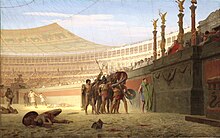Ave Caesar, morituri te salutant
Ave, Caesar, morituri te salutant ("Hail, Caesar, the doomed greet you!") Is a Latin phrase . It is wrongly seen as a greeting from gladiators in the Roman Empire when entering the arena . In fact, it is only attested once in ancient literature, and precisely not for a gladiatorial match.
Morituri is active past participle , so it actually means those who will die .
history
In the ancient sources, the sentence is passed down exclusively in Suetonius , Claudius 21, and Cassius Dio , Roman history 60. In 52 AD, Emperor Claudius had a canal built to drain Lake Fucin for land reclamation. The opening of the canal was to be committed with a naumachie on the lake, in which 19,000 convicts sentenced to death who were not gladiators had to fight. In greeting they shouted: Ave imperator, morituri te salutant! Claudius replied, Aut non ("Or not") to indicate that some of them might survive the fight. The convicts believed themselves pardoned by these words and could only be persuaded with difficulty to start the exhibition match. Probably with these words the condemned tried to arouse the emperor's pity. Research believed that this was the only occasion that this phrase was used.
Legend
There is no evidence for the legend that gladiators greeted in this way when entering the arena, but there are numerous representations that they spread. In 1859 the French history painter Jean-Léon Gérôme painted a picture with this title, in which gladiators in the Colosseum greet the Roman emperor Vitellius . The German publicist Jacob Venedey made the painting the leitmotif of his eponymous writing against the German War of 1866. In 1875, the American poet Henry Wadsworth Longfellow wrote his poem Morituri salutamus on the occasion of a class reunion after fifty years. In Asterix als Gladiator from 1964 the gladiators shout this sentence to Julius Caesar - in contrast to Asterix and Obelix, who only disrespectfully greet him with: "Salut, vieux Jules" (German: "Hello, old Julius!"). The greeting is also quoted in the period films The Last Days of Pompeii from 1935 and Gladiator from 2000. The jazz rock band Colosseum named their debut album Those Who Are About to Die Salute You - Morituri Te Salutant in 1969 . Another variation comes from the group AC / DC and their studio album For Those About to Rock (We Salute You) from 1981.
Individual evidence
- ^ Felix M. Prokoph: "Ave, Caesar, ... te salutant". For the 200th birthday of the classical philologist, librarian and Marburg university man Carl Julius Caesar . In: Journal of the Association for Hessian History and Regional Studies . tape 121 , 2016, p. 135–174, here: 172 .
- ^ Georg Büchmann : Winged Words , 19th edition (1898). Quoted from http://susning.nu/buchmann/0494.html
- ^ Suetonius, Vita Divi Claudii 21 ( online at thelatinlibrary.com, accessed May 21, 2014)
- ^ Eckart Köhne: Bread and Games . in: Derselbe and Cornelia Ewigleben (ed.): Caesars and Gladiators. The power of entertainment in ancient Rome . Philipp Zabern, Mainz, 2000, p. 29.
- ^ Donald G. Kyle: Spectacles of Death in Ancient Rome . Routledge, London 1998, p. 94.
- ^ Jacob Venedey : Ave Caesar, imperator, Morituri te salutant! Leaflet . Muellheim i. Br. 1866, 3rd edition Mannheim 1867
- ^ Henry Wadsworth Longfellow: Morituri Salutamus: Poem for the Fiftieth Anniversary of the Class of 1825 in Bowdoin College at poetryfoundation.org, accessed May 25, 2014.
- ^ Jon Solomon: The Ancient World in the Cinema . Yale University 2000, p. 82.
